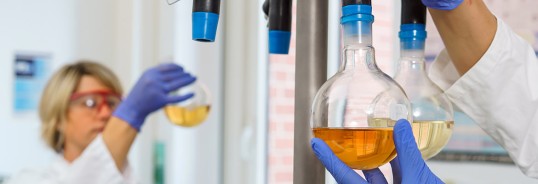Early cancer detection

Source: © Volker Wiciok, Lichtblick
The early detection of occupational diseases, including cancers, is an important part of secondary prevention.
Occupational cancers pose one of the greatest challenges for occupational health. As a result of the long induction periods associated with these diseases, cases continue to occur despite enormous improvements in the field of occupational safety. Exposure to occupational carcinogens frequently occurred decades ago when many hazardous substances had not been sufficiently regulated yet.
Many cancers present at a progressive stage when diagnosed based on clinical symptoms. The aim of cancer screening is therefore to maximise the chance of successful tumour treatment by an early diagnosis.
Available traditional methods of early diagnosis are often not sufficient for early detection of new cancer formations. Although computed tomography (CT) scans of the lungs can detect small lesions, CT scans are associated with radiation exposure. Thus, its regular use needs to be well considered, requiring a justifying medical indication in each individual case. While CT examinations are already offered for the early detection of lung tumours as part of the preventive follow-up examinations of the German Social Accident Insurance, no screening examination for the early detection of mesotheliomas has yet been established.
However, there is justified hope that current advances in biomedical research will lead to the use of novel methods for early detection in the future. Molecular markers represent both an alternative and supplement to conventional methods. Molecular markers are endogenous substances which are produced by tumours in increased or altered form and are then released, for example, into the bloodstream. They can be obtained non-invasively from blood samples or, depending on the site of origin of the tumour, from urine, sputum, and other body fluids and determined in the laboratory using modern molecular biological methods. From the patient’s perspective, these methods are associated with the least possible burden.
There are already some potential new molecular markers, including those for bladder cancer and mesotheliomas. However, these still have to be validated as part of larger, prospective studies. This is to ensure that they are also suitable and effective for use under field conditions. Various studies are currently underway in cooperation with numerous partners in Germany and abroad, under the auspices of the Institute for Prevention and Occupational Medicine of the German Social Accident Insurance (IPA) at the Ruhr University Bochum, in which several markers are being tested individually and in combination for the early detection of cancer.
Promising initial results from one of the IPA studies are now available. In the MoMar study (‘Molecular Markers for Cancer Screening’) two molecular markers for the early detection of mesothelioma were validated using samples from a prospective cohort of formerly asbestos-exposed workers. Around 2,800 insured persons formally diagnosed with asbestosis or other non-malignant asbestos-related pleural diseases (German occupational disease no. 4103) were invited to attend a yearly check-up including blood sampling over a period of ten years. More than 12,500 blood samples were stored in a biobank and used to quantify the tumour markers mesothelin and calretinin. During the course of the study, more than 40 new cases of mesothelioma occurred in the cohort, from whom blood samples were collected prior to clinical diagnosis. Thus, it was possible to test the markers with respect to their ability to detect mesotheliomas at an earlier stage. The combination of the markers calretinin and mesothelin was able to correctly detect 44% of mesothelioma cases up to 15 months before clinical diagnosis. The proportion of false-positive findings was only 2%. For the first time, early detection of mesotheliomas appears possible.
The use of the marker combination of calretinin and mesothelin in follow-up screening for at-risk groups has been endorsed by the committees of the German Social Accident Insurance. Initially, the markers are to be offered only to insured workers with a recognized occupational disease BK 4103, because scientific data show that early detection with biomarkers is possible in this particular group at increased risk for the development of mesothelioma. Whether other asbestos-exposed individuals can also benefit from early detection offer is currently being determined in cooperation with Occupational Health Care (GVS) and individual accident insurance carriers. Meanwhile, CE certification has been obtained for calretinin and mesothelin. Practical implementation of the two mesothelioma markers in follow-up screening is to be established as part of the offer for "Follow-up Examinations for the Early Detection of Mesothelioma" (EVA-Mesothel). A pilot project on EVA-Mesothel is planned for 2022.
Contact

Dr. rer. nat. Georg Johnen
Institute for Prevention and Occupational Medicine of the German Social Accident Insurance (IPA)
Center of Molecular Medicine
Tel.: +49 30 13001-4350
E-Mail
Prof. Dr. Thomas Behrens
Institute for Prevention and Occupational Medicine of the German Social Accident Insurance (IPA)
Tel.: +49 30 13001-4210
E-Mail
